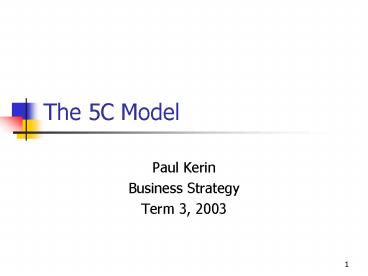The 5C Model - PowerPoint PPT Presentation
1 / 10
Title:
The 5C Model
Description:
CSO cartel; Crown Cork & Seal cooperating with customers and suppliers. 5. 5C sources of value ... Competitors Revenue (CSO cartel) Cost-sharing (banking) ... – PowerPoint PPT presentation
Number of Views:711
Avg rating:3.0/5.0
Title: The 5C Model
1
The 5C Model
- Paul Kerin
- Business Strategy
- Term 3, 2003
2
Why the 5Cs?
- Useful checklist to make sure we address all
sources of potential value as we develop our
strategy most useful in the early
options-generation phase - Checklist not just at the top level (the 5 Cs),
but also the potential sources of value for each
C and issues to consider
3
The 5Cs
- Compete for surplus in your part of the value
chain - Concentrate surplus from other parts of the value
chain - Capture more consumer surplus
- Create surplus by shifting the demand curve
- Cooperate to capture (and create) surplus through
alliances with competitors, customers, suppliers
(and complementors, government, etc)
4
5C Model
EXAMPLES WEVE ALREADY SEEN Nutrasweet competing
directly with HSC CSO concentrating value from
other parts of the value chain (eg,
dealers) Nutrasweet using its initial market
power to capture value from its customers CSO
developing diamond market Nutrasweet developing
aspartame market CSO cartel Crown Cork Seal
cooperating with customers and suppliers
1. Compete
2. Concentrate
5 ways to increase the value you realise
3. Capture
4. Create
5. Cooperate
5
5C sources of value
3. Capture consumer surplus
/unit Retailers (your
customers) You your competitors
Input suppliers
4. Create new demand
P
Demand curve
Costs
2. Concentrate buyers surplus (from
downstream)
1. Compete for producers surplus
P
YOU!
Costs
5. Cooperate to capture (and create) surplus
2. Concentrate supplier surplus (from
upstream)
P
Costs
Quantity
6
1. Competing for surplus is all about developing,
maintaining and enhancing competitive advantage.
We will cover this later in the course for now,
some examples
EXAMPLE
Physical assets Argyles low-cost mine
Location/space Airlines landing slots and
route rights
Privileged assets
Distribution/sales network Avon 25 years ago
(not now)
Brand/reputation Coke, Nutrasweet, Debeers
Patent Nutrasweet
Competitive advantages
Relationship with regulators Favoured nation
status with relevant Govt. Minister
Continuously innovate 3M with new products
Control processes/behaviours McDonalds QSCV
Distinctive competence ability to
Manage information Wesfarmers?
Manage long-run Utility companies
maintainingstructural advantages protected
market
Create/sustain privileged assets Maintaining
favoured nation status
7
2. Concentrating surplus
- Need to first understand what surplus (if any)
exists in each element of the value chain
and why ie, for each element of the
chain - do a five forces analysis - estimate
the surplus currently earned - If any excess surplus exists, assess the
opportunity to capture it - relative
bargaining power analysis - - ability to bypass elements of the value chain
- - ability to forward/backward integrate
8
3. Capturing consumer surplus
Consumer surplus
- Capture analysis
- who are the non-marginal consumers?
- what is their best alternative?
- how can the surplus be extracted?
Producer revenues
P
Segment C
Segment B
Segment A
After segmentation
Before segmentation
9
4. Creating new demand
- Example opportunities
- New uses for product
- Remove barriers to purchase
- Leverage complements
- Tap new segment
- Raise awareness (eg, advertising)
- But must also work out how to capture the new
surplus (see 3)
New surplus created
D2
D1
10
5. Cooperating to capture (and create) surplus
With Whom? Why? - Examples The usual
suspects. Competitors Revenue (CSO
cartel) Cost-sharing (banking) Customers Rev
enue (new product development) Suppliers Co
st (process improvement) But dont forget other
potential allies eg Complementors Revenue
(hardware and software) Government Revenue
(agribusiness joint funding of research into
new wheat varieties)

